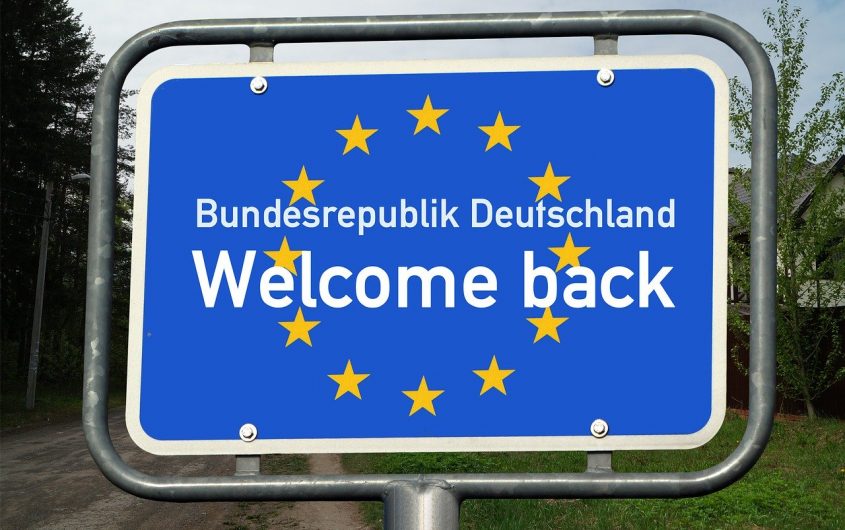
Gerd Altmann from Pixabay
Lesson from the Corona Crisis: The Neighbors Have Gone Mad

Karl-Matthias Klause
Karl-Matthias Klause is a German diplomat and historian, since 2017 Head of the Economic Department of the German Embassy in Washington (Minister), from 2009-13 spokesperson of the Embassy, before that posted in Warsaw and London.
He served in the Foreign Office, the Federal Chancellery, and the German Bundestag (Foreign Affairs Committee. He is trained as negotiator and teaches diplomatic practice.
He studied History of the Middle Ages, modern history, and transatlantic relations as well as philosophy, German, and English literature in Münster and Berlin (FU). He is a board member of the Shakespeare Society of 1864.
The article is written in the author’s personal capacity and does not necessarily reflect the views the German government.
Spending time alone at home gives you time to think. Time to come to deeper understanding. To realize, for example, that the corona crisis is both a stress test and a test of character. And if we Germans compare ourselves with other nations, it is difficult to avoid the conclusion that the crisis has brought out the best in us.
Nobody has handled it better. We were better prepared than anyone. We reacted the quickest (oh, the Americans!). Our hospitals have the best equipment (what is going on in Italy?). We have rational crisis management (do you even remember what that is, Britain?!). We have wonderful media outlets who praise these achievements, and numerous commentators to transmit our sentiments with quiet modesty to the wider world. To the doubters we say: have a look at France, or Belgium! But this is not the time for criticism. We have closed our borders, limited air traffic, gone through lockdown, all the while singing from our balconies. Solidarity and humanity have made their home in Germany.
No offense to our neighbors. Thirty years ago, we heard a lot about the Polish Solidarity movement, back when Poles were throwing off the yoke of Communism. Now, when people in Europe talk about solidarity, it seems to be another way of saying that we Germans should open our pocketbook. This year we may have to forego public commemoration of the 30th anniversary of German unification. Probably for the best—one less occasion for others to make new requests for assistance or recompense. Come to think of it, maybe we should cancel our upcoming EU presidency this year before it costs us dearly.
How did this happen? In 1989, with the fall of the Wall, we brought Europe back together. What belonged together grew together, as Willy Brandt once hoped. We inspired our neighbors to discover their better selves: the delicate blossoming of democracy in Poland, the tentative border openings in Austria and Hungary, Gorbachev’s Soviet Union overcoming its mistrust of Germany. We responded cautiously to the Americans’ offer to include us as a “partner in leadership,” because leadership—well, that probably would have involved greater risk-taking and certainly higher defense spending. We were prepared to give a colossal gift to France in the form of the euro, and in return we got unity. We encountered historically grounded confidence from Britain and among our small and medium-sized neighbors. Yes, the silent joy at Germany’s new role went round the globe. Did we not?
With the peaceful revolution and the reunification of the continent, Germany gave Europe a foothold, a center, and a meaning. We advanced our neighbors a down payment of trust. We opened our home to them for the 2006 World Cup, celebrated with them and even generously refrained from taking the world championship before our home crowd. Did we not?
And now, barely thirty years later? Our neighbors have lost direction, moderation, and all sense of responsibility, maybe even their minds. Instead of overdue reforms at home, the French president is indulging in demands for Europe with a meticulously French polish. Our Polish neighbors, on the other hand, have lost their democratic compass and are busily deconstructing the reforms that we fostered to bring them into the EU and NATO. There is no gratitude from the Czech Republic for re-industrialization. Hungary is beyond help. Our gentle reminders that they should cherish and protect democracy and the rule of law (as if we didn’t know what a dictatorship is) earns us suspicious glances—the collective memory is unfortunately short. Which brings us to our co-linguists to the south-east, who are pursuing painfully clever and incredibly successful policies. So opportunistic! Let’s not even get started on the Belgians, the Dutch, the Swedes, and all the rest.
The neighbors in the south lack discipline, in the east they lack democratic culture and have fallen victim to populists. Our neighbors are so consumed by their isolated national destinies that it strikes fear into the heart.
If we were not single-handedly upholding multilateralism, we would be on our own! Without us, democracy, the rule of law, separation of powers, and a free press would be nothing more than empty words. We are surrounded by historical amnesia, ignorance, and self-righteousness on every side.
Can we no longer rely on our neighbors? We do not expect gratitude, but reason and interests should suffice for them to follow us. We are the last redoubt of pragmatism, proportion, and historical perspective. We are ready to forge ahead. We look around, but our neighbors are nowhere to be seen. Still, we best keep moving forward—even on a “Sonderweg.”
This is a shortened version of an article published originally in German in The European on May 26, 2020.








